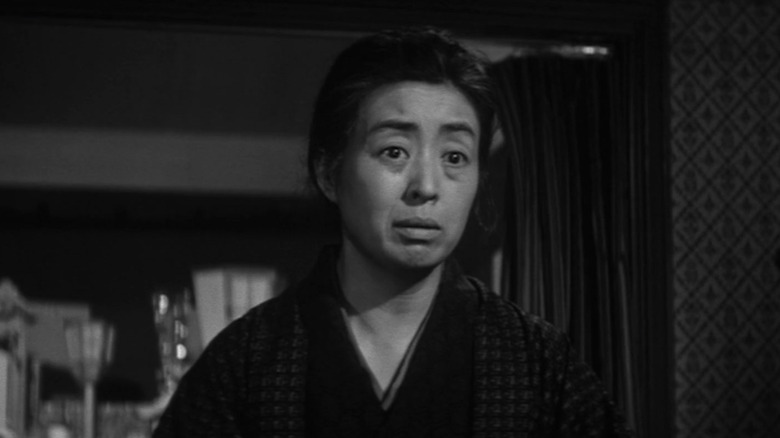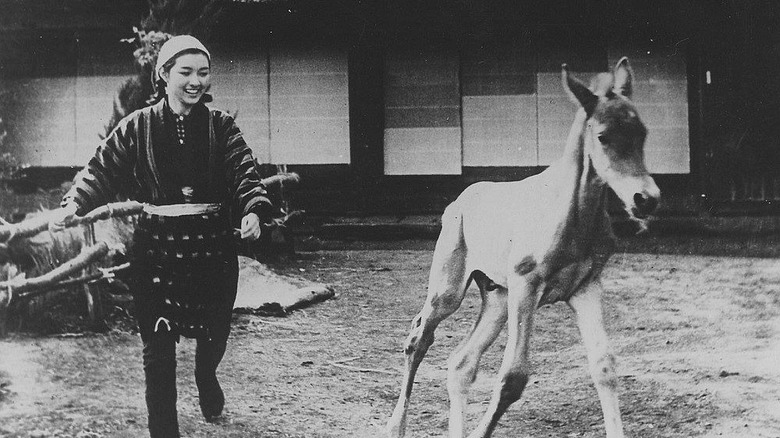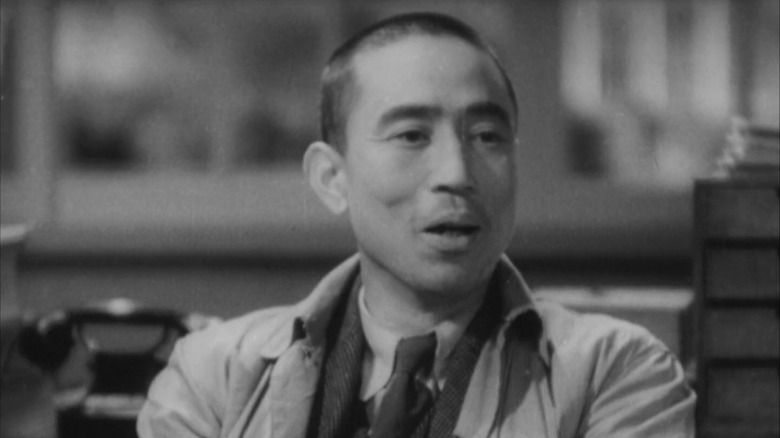The Film Akira Kurosawa Most Enjoyed Making Was One He Didn't Even Direct
We may receive a commission on purchases made from links.
Legendary Japanese filmmaker Akira Kurosawa is best known for his epic historical pieces like "Seven Samurai" and "Rashomon," but the most fun he ever had on a film set wasn't even his own. Before he became a globally acclaimed director, Kurosawa worked as an assistant director on Japanese productions like the 1941 film "Horse." Thanks to director Kajirō Yamamoto's hands-off approach, the film has quite a bit of Kurosawa's influence.
Despite being credited as an assistant director, Kurosawa would often be put in charge of entire scenes on the set of "Uma," translated as "Horse" or "Horses." It might sound a little bit exploitative, but the young filmmaker saw Yamamoto's trust as an honor, an opportunity for him to learn.
"In order to give us experience with directing actors, Yama-san often had assistant directors take charge of second-unit shooting," he recalled in his memoir Something Like An Autobiography. "Sometimes he would even shoot a scene up to a certain point and then go home, leaving the rest in our hands. If you don't have a tremendous amount of faith in your assistant directors, you can't do a thing like that."
Yamamoto placed quite a bit of trust in Kurosawa during the filming of "Horse." This was one of the last films that Kurosawa made before his directorial debut in 1943, and he was prepared for the pressure. "During the filming of 'Horses' Yama-san did indeed come to the location set-ups," Kurosawa said. "But usually after spending one night there he would say, 'Take care of it,' and go back to Tokyo. It was in this way that I was trained, before becoming a director, to handle the crew and to coach the actors."
Kurosawa had a lot of creative control on 'Horse'
Kurosawa wasn't given a directing credit on "Horse," but he took on a directorial role in more ways than one. In addition to taking control on set, he also co-wrote the film — not to mention the editing process, which Kurosawa wrote was placed "entirely in [his] hands."
Like many other Japanese films, "Horse" grapples with themes of man and nature and features long shots of large sweeping landscapes. Still, there is quite a bit more camera movement than in the average Japanese film, such as a tracking shot that follows the protagonist Ine through a crowd of horses as she tries to find her foal.
The frequent use of tracking and panning shots in "Horse" suggests Kurosawa's influence. He preferred more action on screen, while traditional Japanese films opted for more meditative, slow-burning shots. Ine is also more rebellious than a conventional Japanese character. The film featured lots of close-ups and a very people-focused story. These are some of the key differences that Kurosawa notes between his own films and other Japanese cinema.
"[T]he Japanese critics go on and on about how Western I am," the filmmaker complained in a 1960 interview with Donald Richie. "And mainly just because I do my own cutting and happen to prefer a fast tempo and am really interested in people. That's the thing about most Japanese films — they don't really give a damn about people."
Even though "Horse" wasn't technically Kurosawa's film, the freedom he was given on set combined with his incentive to succeed was enough to make him love the process more than any other film he ever made. "You know a film I really enjoyed making?" he confessed, at the height of his career. "'Horse,' way back in 1941."
The 1941 film has Kurosawa's touch
Kurosawa compared the attention and love that he put into "Horse" to a long-winded affair with a married woman.
"That was Yamamoto's production and I was only an assistant director but there is no other picture into which I put so much affection," Kurosawa admitted during his interview with Donald Richie. "The director is like a grand lord, and the assistant director is like a retainer secretly and hopelessly in love with the lord's wife. Oh, I loved that film — worked on it three full years."
Yamamoto wasn't Kurosawa's favorite director though — that honor belonged to Kenji Mizoguchi, a peer of Kurosawa's who was best known internationally for the fantasy film "Ugetsu."
"People always say that his style is purely Japanese and that mine is foreign," the "Ran" director said. "I just don't understand that. It might have something to do with what we make pictures about. His central figures are always women, aren't they? [...] Women simply aren't my specialty."
Women may not be Kurosawa's specialty, but he certainly helped write and direct the protagonist of "Horse" into a rebellious and compassionate character. "Horse" follows some Japanese cinematic trends more closely than Kurosawa's other films did, but it still undeniably has his charm, perhaps in a more raw form than any other film he ever made. But maybe that Japanese sensibility is exactly why Kurosawa likes "Horse" so much. As he puts it, quite simply, "after all, I am Japanese."


